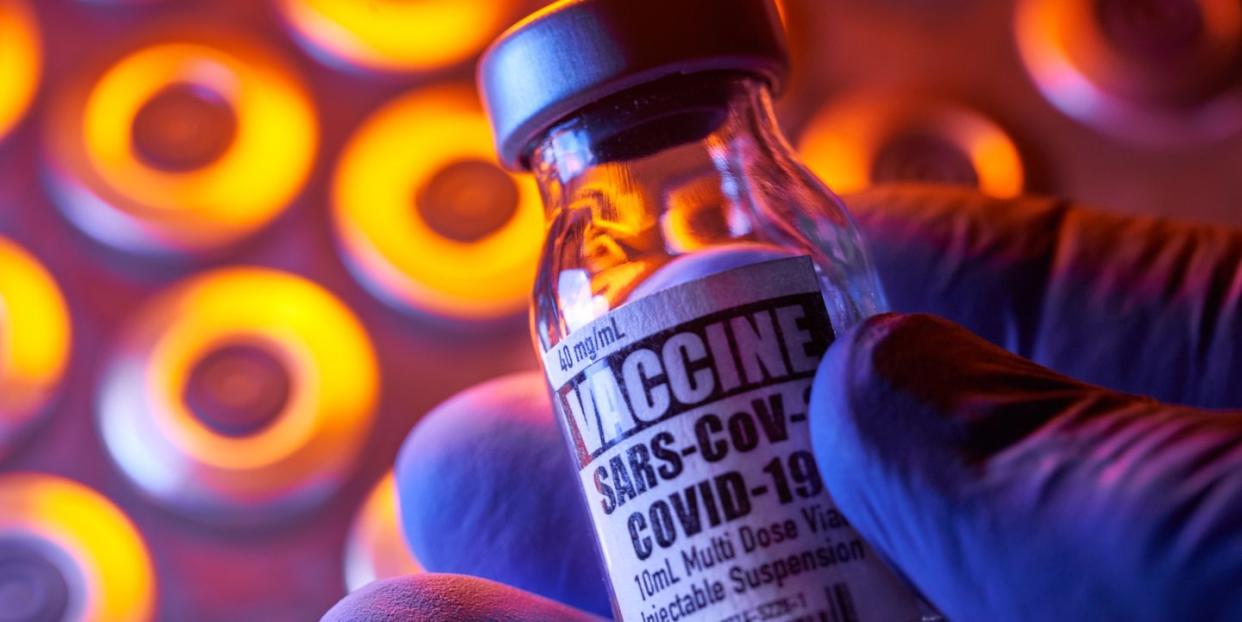Allergic Reactions to the COVID-19 Vaccine Are Extremely Rare, New CDC Report Finds

A new report issued by the Centers for Disease Control and Prevention (CDC) has found that, while severe allergic reactions to the COVID-19 vaccine can happen, they are rare. The report, which was published on Jan. 6, found that the risk of developing a severe allergic reaction after the vaccine is 0.001%, based on data available so far.
The news comes on the heels of warnings that people with a history of severe allergic reactions to vaccines or injectable medications should talk to their doctor before receiving the COVID-19 vaccine. Both the Allergy & Asthma Network and the CDC say you should let your medical provider know if you have experienced anaphylaxis, a severe and life-threatening allergic reaction that can cause difficulty breathing, to a past injected medication or vaccine.
However, people with a history of severe allergic reactions not related to vaccines or injectable meds—such as food, pet, venom, environmental, or latex allergies—should still get vaccinated, per the CDC.
The guidance followed after a few people reported reactions to the vaccine in the U.S. A healthcare worker in Oregon was hospitalized after experiencing anaphylaxis to the Pfizer vaccine; a doctor in Boston with a history of a shellfish allergy also felt dizzy and had a racing heart after receiving the Moderna vaccine.
It’s important to at least be aware of these potential reactions, even if they are rare, says Jamie Alan, Pharm.D., Ph.D., an assistant professor of pharmacology and toxicology at Michigan State University. “An amount of concern is warranted, although this should not automatically sway someone [to not get vaccinated],” Alan says. “This is not a new concern, as an allergic reaction to any vaccine is always a risk.”
That raises some big questions, especially if you have a history of allergies. Here’s what you need to know, according to experts.
How common are severe allergic reactions to the COVID-19 vaccine?
The recent report issued by the CDC analyzed data from the Vaccine Adverse Event Reporting System between Dec. 14 – 23, when 1,893,360 first doses of the Pfizer-BioNTech vaccine were administered. Of those patients, 21 developed anaphylaxis. The report also found that 71% of those reactions happened within 15 minutes of the patients being vaccinated, which is during the timeframe that healthcare providers recommend you wait in their office to see if you develop a reaction. However, the timeframe in which people experienced this severe allergic reaction spanned between two minutes after vaccination to 150 minutes afterward.
Of the 21 people who developed anaphylaxis after being vaccinated, 17 had a history of allergies or allergic reactions and seven had a history of anaphylaxis. The CDC was able to find follow-up information on 20 of the patients who had anaphylaxis and found that all had recovered or were discharged home.
There were other, less severe allergic reactions, too. The CDC researchers found that 86 people had what they classified as “non-anaphylaxis allergic reactions,” which can include anything from hives to minor swelling. To be on the safe side, the agency urges medical care providers to have epinephrine (adrenaline in the form of an EpiPen) and equipment available to open up a person’s airway in case of a severe allergic reaction.
Overall, the results of the report are promising, says Richard Watkins, M.D., an infectious disease physician and professor of medicine at the Northeast Ohio Medical University. They show that “the vaccine is safe and effective,” he says, adding, “the risks from COVID-19 far outweigh those of the vaccine.”
What causes an allergy to a vaccine?
Typically, a person has an allergy to a specific component of a vaccine, not the whole thing. “It’s often a preservative or, in the case of the flu vaccine, it may be residual egg protein,” says John Sellick, D.O., an infectious disease expert and professor of medicine at the University at Buffalo/SUNY in New York.
The CDC specifically lists the following as potential causes of allergic reactions to vaccines:

The vaccine antigen
Residual animal protein
Antimicrobial agents
Preservatives
Stabilizers
Other vaccine components
Overall, though, the preservative used (thimerosal, for example) is the most common potential allergen, according to Purvi Parikh, M.D., an allergist with Allergy & Asthma Network. “Usually, preservative-free vaccines are well tolerated,” she says.
Is there any way to know if you’ll be allergic to the COVID-19 vaccine you receive?
The Pfizer and Moderna vaccines were not tested on people with a history of severe allergies due to obvious concerns about the potential for life-threatening reactions, says Stanley Weiss, M.D., professor at the Rutgers New Jersey Medical School and the Department of Epidemiology at the Rutgers School of Public Health.
He explains that typically “people who have a prior history of allergic reactions have a higher risk of reacting to something that’s new.”
If you’re allergic to a particular ingredient, like glycerin, and it’s in a vaccine, you’ll likely have a reaction to it, Dr. Sellick says. The same is true for people with egg allergies. “If you knew in advance that you had anaphylactic reactions to eggs, I would not want to give you an influenza vaccine made with egg,” he says. (There are egg-free versions, though.)
After the Pfizer and Moderna vaccines were granted Emergency Use Authorization from the FDA, both companies released their full list of vaccine ingredients. It’s unclear at this point what people have had a severe allergic reaction to in either vaccine, but the lipid polyethylene glycol (one of the fats used to envelop the mRNA to make sure it’s delivered to cells) is potentially suspect, Alan says.
Short of comparing your known allergies to vaccine ingredients, it can be difficult to tell if you’ll have an allergic reaction to a vaccine, “particularly if it’s the first time you’ve received it,” says Robert Weber, Pharm.D., administrator for pharmacy services at The Ohio State University Wexner Medical Center and assistant dean for Medical Center Affairs at The Ohio State University College of Pharmacy. Unfortunately, there’s “no way” to know for sure if any one person who has a history of allergies will have a severe allergic reaction to the COVID-19 vaccine.
So, who should and shouldn’t receive the COVID-19 vaccine?
As of right now, the Allergy & Asthma Network says that people should “take caution” if they have a history of anaphylaxis to another vaccine or an injected medication, and should not receive the vaccine if they have a history of anaphylaxis to any component of the available COVID-19 vaccines. People who are allergic to polyethylene glycol or polysorbate specifically should not get either vaccine, per the CDC. (Polysorbate is not found in the Pfizer and Moderna vaccines, but is closely related polyethylene glycol.)
If you had an allergic reaction right after your first dose, you should not get the second dose, per the CDC. Instead, your doctor may refer you to an allergy specialist.
The CDC also recommends talking to your doctor if you have had an immediate allergic reaction to a vaccine or injectable therapy for another disease in the past, even if it was not severe, like hives or swelling. “If anyone has a concern, they should always talk to their doctor,” Dr. Sellick says. Most medical offices have a policy on this, but he recommends sticking around for a little while after you’re vaccinated, so they can help out if you do happen to have a reaction. (The CDC recommends 15 minutes if you have no history of allergies and 30 minutes if you do.)
❗If you have received the COVID-19 vaccine and think you might be having a severe allergic reaction after leaving the vaccination site, seek immediate medical attention.
If you’re getting vaccinated in a place that isn’t your doctor’s office, make sure the person giving your vaccine is aware of your personal allergy history. Once the vaccine becomes more widely available, “if an allergist is worried, they can skin test you and do a challenge with full or half of the vaccine under medical supervision in their office,” Dr. Parikh says.
Bottom line: Experts stress that serious allergic reactions to vaccines are extremely rare and getting vaccinated is an important step in ending the coronavirus pandemic, so when in doubt, talk to your doctor. They will be able to guide you on the next best steps. “I’ve been administering vaccines for 20 years and have probably given 10,000 vaccines,” Weber says. “I have not seen one serious reaction.”
Go here to join Prevention Premium (our best value, all-access plan), subscribe to the magazine, or get digital-only access.
FOLLOW PREVENTION ON INSTAGRAM
You Might Also Like

